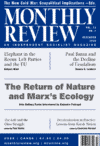
December 2020 (Volume 72, Number 7)
The United States is now in a New Cold War with Russia and China, with the focus increasingly on the latter and involving a direct challenge to U.S. hegemony over the world economy. | more…

The United States is now in a New Cold War with Russia and China, with the focus increasingly on the latter and involving a direct challenge to U.S. hegemony over the world economy. | more…

In this issue of Monthly Review, we publish two articles marking the two-hundredth anniversary of the birth of Frederick Engels. In the attempt to address our planet’s ecological crisis, Engels’s work has once acquired a renewed importance. His analysis of the dialectics of nature was to play a formative role in the development of modern ecological and evolutionary views and is now being rediscovered in that context. | more…
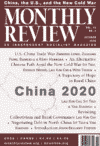
This special issue of Monthly Review, “China 2020,” is the product of a long period of cooperation with critical Chinese Marxist scholars. This has resulted in an extensive series of articles on contemporary Chinese social and economic relations since 2012, to which most of the authors in the present issue have previously contributed. It takes on a special significance due to the growing conflict between the United States and China, making critical Marxist analysis in this area all the more important. | more…

Climate change is just one part of a larger planetary emergency related to the crossing of planetary boundaries due to the system of capital accumulation. New diseases that can be transferred from animals to humans such as COVID-19 are another part. Knowledge of the overall planetary emergency in which the world is immersed, and its relation to capitalism, is thus crucial to our time. | more…
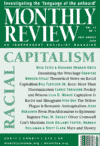
The entire United States has been upended by weeks of protests, extending to over 150 cities, sparked by the racist police murder of George Floyd. The present special issue of Monthly Review is devoted to exploring the complex interweaving of the classical Marxian critique with the rapidly developing critique of racial capitalism. | more…

The current massive oil glut is the product of the effects of the tight oil or shale oil revolution, which for a time turned the United States into the biggest oil and gas producer in the world. Now, suddenly as a result of an overproduction of world oil, made far worse by the sudden falloff in demand due to the COVID-19 pandemic, we are witnessing the possible euthanasia of the U.S. tight oil industry, bleeding cash even before the oil price collapse and encumbered with mountains of debt. | more…
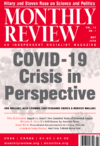
In its wider economic, ecological, epidemiological, and public health context, the current COVID-19 pandemic demonstrates the enormous dangers of the metabolic rift in human ecology and epidemiology brought on by capitalist social relations in the age of monopoly-finance capital, global agribusiness, and intricate, globe-spanning supply chains associated with the extreme exploitation and expropriation of both human beings and nature. Neoliberalism, representing the inner logic of capitalism, has left the world vulnerable to catastrophe wherever it has come into play. | more…
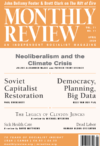
Today, at the bicentennial of Frederick Engels’s birth, it is worth taking a brief look at Engels’s theory of the labor aristocracy, its connection to V. I. Lenin’s thinking, and the significance of these ideas in light of the current capitalist conjuncture. | more…

According to the U.S. Bureau of Labor Statistics, the U.S. economy is experiencing an unemployment rate that is at a fifty-year low. Yet, wage growth continues to be weak, with continuing wage stagnation even at the peak of the business cycle. A major and largely undertheorized reason for the sluggish wages in a period of seeming full employment is to be found in the fact that the new jobs being created by the economy do not measure up to those of the past in terms of weekly wages and hours, or in the degree to which they support households or even individuals. | more…

According to the U.S. Bureau of Labor Statistics, the U.S. economy is experiencing an unemployment rate that is at a fifty-year low. Yet, wage growth continues to be weak, with continuing wage stagnation even at the peak of the business cycle. A major and largely undertheorized reason for the sluggish wages in a period of seeming full employment is to be found in the fact that the new jobs being created by the economy do not measure up to those of the past in terms of weekly wages and hours, or in the degree to which they support households or even individuals. | more…
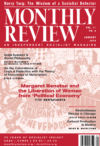
The coup against the Bolivian government under Evo Morales came straight out of the latest political-military manuals of the U.S. imperial state. These manuals provide instructions on how systematically to undermine the reputation of a popular, elected leader with accusations of dictatorship, corruption, and various other forms of character assassination in order to soften support on the left. Moreover, these manuals provide step-by-step instructions on how to prepare the political and military bases of a coup. | more…
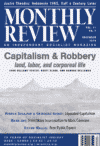
Bloomberg insists that we need to get our priorities straight: the economy comes before the earth, capitalism before nature. Yet, from any sort of realistic, world-wise perspective, it is clear that we are faced with two immense, imminent, and irreversible crises, one threatening within as short a time as a year to destabilize the world capitalist economy, the other promising to destroy the planet as a home to humanity, destabilizing industrial civilization and undermining the survival chances of hundreds of millions or even billions of people this century. Both represent the culmination of capitalist contradictions over centuries of development and both point to the need to transform society in revolutionary ways. It is the coevolution of economic and ecological contradictions under global monopoly-finance capital that defines the epochal historical crisis of our times. In this new issue of Monthly Review, we also celebrate Monthly Review‘s relationship with the annual School of Ecology in Mauritius. | more…

Immanuel Wallerstein, the celebrated world-systems theorist and longtime contributor to Monthly Review and Monthly Review Press, died on August 31, 2019. Wallerstein first achieved international fame with the publication in 1974 of his The Modern World-System: Capitalist Agriculture and the Origins of the World-Economy in the Sixteenth Century (the first in a four-volume masterwork on the Modern World-System. We pay tribute to Wallerstein in this new issue of Monthly Review. | more…
Notifications